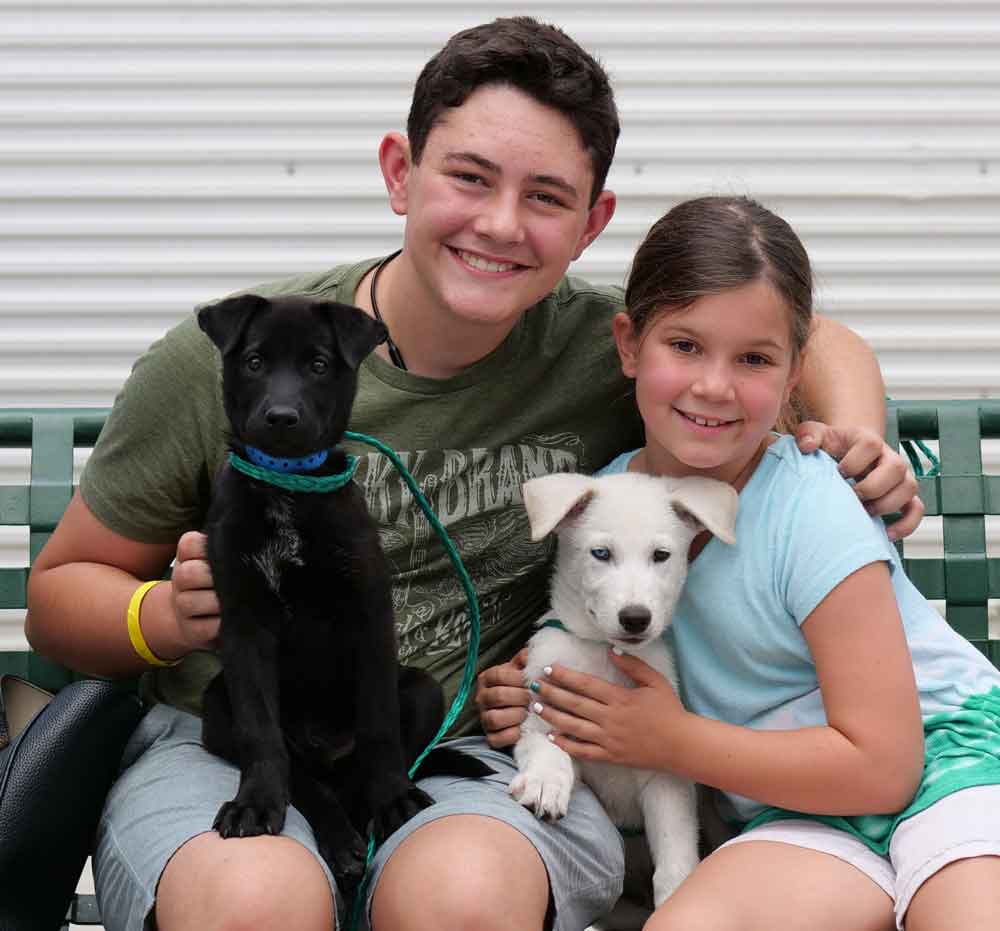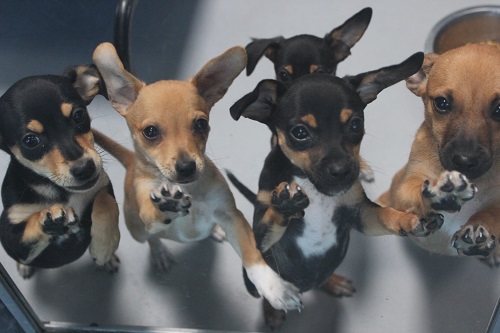10 Things You Need to Know About Adopting Puppies
Congratulations! You have a new puppy — now what?
The early months of your puppy’s development will set the stage for his or her behavior later in life. Many common behavior problems stem from unresolved issues in the early stages of puppies’ lives. All of these problems can be prevented or addressed successfully while your puppy is still young.
10 Things You Can Do Now to Have a Well-Mannered Dog for Life
 Be a Good Manager
Be a Good Manager
Understand that your puppy is a dog and will do “dog things.” Scolding is a natural, but it is much more effective to manage puppies’ activities. If your puppy chews on your favorite shoe or has an accident on your carpet, it is because you were not watching him. Puppy-proof your home by removing low objects, closing bedroom doors and keeping your puppy in eyesight.
Get Your Puppy Used to Human Handling
Early puppy handling helps puppies bond with you, gets them comfortable to human touch, calms excitable puppies and helps them grow out of the biting stage more quickly. Here’s how you can do that.
Kneel on the ground with your puppy sitting between your legs facing away from you. Put your hands against your puppy’s chest to steady him against you. Your puppy should not be able to reach your hands or arms to bite. When he is calm, start petting him all over very slowly with one hand, leaving your other hand in place. Speak slowly and calmly. Work up to being able to easily cup your puppy’s chin in your hand so that you can massage his muzzle with your fingers. Done correctly, most puppies will soon be feeling very, very sleepy!
Respond Positively to Behaviors You Want to Encourage
Calm behaviors like sitting or lying down are almost always appropriate choices for your puppy to make. If you were to praise your puppy and give him a treat whenever he happened to sit instead of jump, you will soon have a puppy who sits more and jumps less.
Think ahead about various situations your puppy is likely to be in and decide on the behavior you WANT from him rather than waiting for bad habits to develop on their own. Teach the desired behavior in a rewarding way and your puppy may never even try the unwanted behaviors!
Refuse to Respond to Behaviors You Don’t Want to Encourage
If you don’t want your dog to bark for attention, don’t acknowledge him or go to him when he is barking. If you don’t want your dog to jump on people, don’t pay any attention to him until all four feet are on the floor. Keep in mind that you are giving your dog the gift of your attention even when you are reprimanding him. To many puppies, this is better than no attention at all and will actually encourage behaviors you don’t want.
Create Positive Socialization Experiences
Puppies are still very impressionable until about five months old. This is your window of opportunity to give your puppy lots of positive experiences. Don’t let your puppy form his own opinions by chance — SHOW him that new people and things are fun. Here are some ideas. Praise and give your puppy treats when he meets children or when strangers pet him. Take him places with you when he’s old enough. Set up playdates with other friends and allow him to get some exercise.
Get Help from Other Well-Behaved Dogs
Here at The Animal Foundation, one of our most successful programs is Dogs Playing for Life. This enrichment playdate allows dogs to enjoy being dogs. They help correct each other from bad habits under the supervision of our staff. You can bring you puppy to something similar. Look for a local trainer or group that mimics a supervised playtime. Although it is important for you as the owner to teach your puppy good manners, another well-behaved dog can help reinforce it.
Stop Leash Pulling Early
Leash pulling is the number one problem in obedience classes. If you allow your puppy to pull against the leash now when he is small, he will continue to pull as hard as he can when he is bigger. You can easily prevent this. Whenever your puppy makes the leash tight, stop and wait for your puppy to try a different behavior (looking at you, sitting, taking a step back, etc.) When he does, praise him and give him a treat as you encourage him to walk with you in the opposite direction.
Find Chew Toys Your Puppy Really Likes
The goal is to give your puppy chew toys that he or she will prefer over your furniture, shoes, carpeting, etc. Some long-lasting options are Kong toys, sterilized beef bones, and knotted rope “bones.” It’s a good idea to make the toys appealing right from the start by putting some dog treats inside the Kong and stuffing moist dog food or small amounts of cheese or peanut butter inside the hollow beef bones. When your puppy is teething, you can plug the small hole in the Kong and fill it with broth and freeze it. Similarly, moistened rope bones can be frozen to soothe and numb tender gums. Rotate your puppy’s toys to keep them new and exciting.
 Actively Work to Prevent Aggressive Behavior
Actively Work to Prevent Aggressive Behavior
To help prevent protectiveness of food and toys, approach your puppy when he is eating and put something better in his bowl. You can do something similar when your puppy is chewing one of his toys. Exchange the toy for a treat and then return the toy to your puppy. Your puppy should welcome your approach by wagging his tail and perhaps even backing away from his food or toy. This will even make it easier to retrieve stolen articles from your dog without confrontations.
Got to Professional Puppy Training
A good training class will save you a lot of effort by instructing you on exactly how to teach basic commands while providing puppies with essential dog-to-dog socialization in a safe, controlled environment. Preventing problems is always easier than fixing them later!

